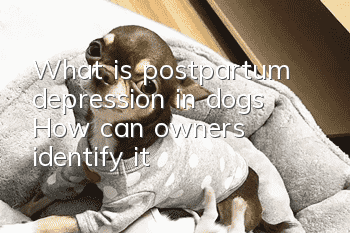What is postpartum depression in dogs? How can owners identify it?

The word depression is not unfamiliar to us. From actors to directors, writers to presenters, people from all walks of life have suffered from depression. Nowadays, more and more people are aware of the dangers of depression, but what many people don’t know is that depression harms not only humans, but also animals... What is postpartum depression in dogs? What should owners do? How to tell?
What is postpartum depression in dogs?
When a female dog develops depressive symptoms after giving birth, she is likely to suffer from postpartum depression. This may be caused by hormones, current stress or past anxiety, etc., and can lead to physical discomfort and various negative consequences for the dog. Behavioral performance.
From a physiological point of view, dogs’ hormones will steadily increase during pregnancy. When they give birth, their hormones will suddenly drop. This will affect the levels of dopamine, progesterone, and prolactin in the body, thus affecting the dog’s mood and hormones. Levels change dramatically in a short period of time, and this change is what causes depression.
Another cause is stress, which often occurs along with hormonal imbalances. Weight gain, hormonal changes, and the actual birth can be a very stressful event for dogs, which can lead to depression. Additionally, dogs may be more likely to experience birth stress if they have high levels of daily anxiety or have experienced extreme stress in the past.
Symptoms of postpartum depression:
To quickly recognize postpartum depression so they can help their dogs, owners need to know some common symptoms.
Loss of interest in cubs
If the mother dog is not caring for her puppies, she is most likely experiencing postpartum depression. Not cleaning up the living environment, not spending time with the pups, or even caring for them are all signs that a mother dog is overwhelmed by postpartum depression. Even if she always lies with her pups, pay attention to how interactive they are. Does the mother pamper them? Or does she check on them? Does she allow them to come close? Or does she just leave them alone? It is important to note that it is the entire group of puppies that the mother loses interest in, rather than individual puppies.
Excessive sleep
After giving birth and caring for a whole litter of puppies, the mother dog will obviously be more tired than usual. However, it is not normal to sleep too much despite their lack of energy. In fact, a nursing dog will wake up regularly to check on her puppies, urinate, defecate, and eat. If you notice that your baby is sleeping most of the time, it may be a symptom of postpartum depression. Normally, the baby will feel very tired for a while after giving birth, and will feel very tired in the next few days or days.You will gradually become more energetic within the week. If the puppies actively interact with the mother dog and the mother dog is unwilling to wake up, then this is a very obvious symptom.
Loss of appetite
Has the female dog suddenly stopped eating? If so, this is not normal. The mother dog may be reluctant to leave the puppies, but when necessary, she will leave for a short period of time for food and water. Normally, its bowl should be placed not far from the cub, so that its stress will be reduced a lot. Therefore, if your baby still shows a loss of appetite or even refuses to eat in the first few days after giving birth, this is a sign that she may be experiencing postpartum depression.
Anxiety
After giving birth, bitches will change in their behavior, but there are some key behaviors that indicate anxiety. Does it bark often? Sudden and frequent barking is usually a sign of stress and shows that the dog is overwhelmed. Is he obsessively licking the same spot? This is a compulsive behavior that dogs often use to comfort themselves. In addition, is your dog easily agitated, nervous, and avoiding you or other people? All of these behaviors are signs of anxiety in dogs and are signs and symptoms of postpartum depression in dogs.
Invasion
Aggressive behavior may appear during pregnancy and after birth until the puppy is weaned. This is normal no matter who you are, even if you are the owner. When aggressive behavior is excessive and lasts for a long time, it may also become a sign of postpartum depression.
Dogs, like all women, may face unprecedented pressure after giving birth, so owners must provide them with support and help during pregnancy and during the period after birth!
- Why don’t dogs like having their paws touched?
- Why is the dog vomiting white foam?
- How to train Shiba Inu puppies? Daily training methods for Shiba Inu puppies!
- How to tell when dogs are constipated? Some common factors that cause dog constipation!
- What to do if your dog is hit by a car
- How do I discipline Alaska’s dog who loves to bite?
- St. Bernard dog gastroenteritis symptoms and treatments
- How to choose Samoyed? Samoyed buying tips!
- When your dog has these abnormal conditions, don’t you pay attention?
- What should novices pay attention to when buying a pet dog? These tips can help you!



